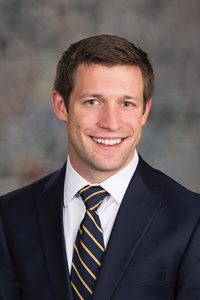Bill would limit Medicaid waiver applications
A bill that would prevent Nebraska from seeking waivers from the federal government for programs related to people eligible under Medicaid expansion was considered Feb. 27 by the Health and Human Services Committee.

LB815, introduced by Lincoln Sen. Adam Morfeld, would prohibit the state from applying for or implementing a Section 1115 waiver—a federally granted exemption enabling states to have more flexibility in creating a state-administered Medicaid program—concerning any experimental, pilot or demonstration project applicable to the Medicaid expansion population.
Morfeld said he introduced the bill in response to the state Department of Health and Human Services announcement that it has applied for a waiver to establish a two-tiered system for Medicaid expansion. Under the waiver, newly eligible Nebraskans will be required to meet work and wellness requirements, he said, and the expansion that was approved by voters in 2018 won’t be implemented until Oct. 1, 2020.
Morfeld said the public response to the new waiver program was “overwhelmingly negative” and that its implementation would ignore voters’ intent.
“It is an option that the department is pursuing that makes it overly burdensome and complex for those who just want to see a doctor, and I think it is in violation of the law,” he said.
Jeannette Jones-Vazansky of the Lincoln alumnae chapter of Delta Sigma Theta Sorority testified in support of the bill. She said the waiver program creates barriers that would prevent Nebraskans from obtaining medical care.
“Passing LB815 is an opportunity to assure health care access to thousands of Nebraskans without burdening them with excessive requirements,” Jones-Vazansky said.
Tiffany Friesen Milone of the OpenSky Policy Institute also testified in support. She said DHHS has estimated that the two-tiered system would cost about three times more in administrative costs than an expansion without additional requirements. A federal Government Accountability Office report showed that taxpayers have spent $408 million on similar programs in five states, Friesen Milone said.
“All these costs are significant and unnecessary,” she said.
Andy Hale of the Nebraska Hospital Association also testified in support of the bill. He said the proposed Medicaid expansion does not include dental coverage, which could impact other health issues.
“Studies have shown a strong association between oral health and illnesses such as heart disease, diabetes and cancer,” Hale said.
Jeremy Brunssen, interim director of the DHHS Division of Medicaid and Long-Term Care, testified against LB815. He said an 1115 wavier is central to the state’s Medicaid expansion and undoing it would “discard months of progress” toward the Oct. 1 launch date due to staff retraining and computer reprogramming.
“If this bill were to go into law, we would need to significantly change our approach,” he said, “and [that] could delay the beginning of the benefits many Nebraskans need.”
The committee took no immediate action on the bill.

